Note: Your are not logged in. We can not keep your scores or track your progress unless you Register and Log In
Driver's Handbook on Cargo Securement - Chapter 13: Large Boulders (continued)
Tie-down Requirements
Requirements
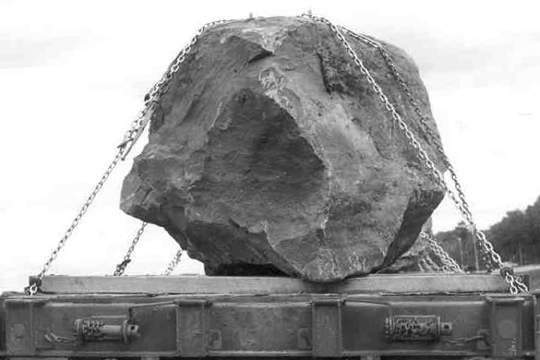
Use only chain to secure large boulders.
Tie-downs in direct contact with the boulder:
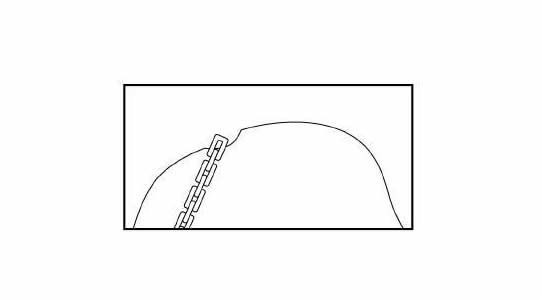
Should be located in valleys or notches across the top of the boulder
Must be arranged to prevent sliding across the rock surface.
Special Circumstances: Securing a Cubic-Shaped Boulder
The securement of a cubic-shaped boulder must meet these requirements in addition to the other large boulder requirements in Section 13.
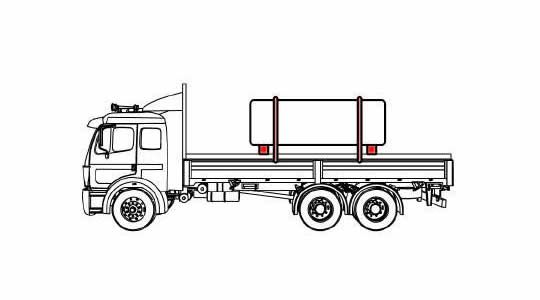
Secure each boulder individually with at least two chain tie-downs placed side-to-side across the vehicle.
Place tie-downs as closely as possible to the hardwood blocking used to support the boulder.
Note: The aggregate WLL of the tie-downs must be at least 50% the weight of the boulder.
Special Circumstances: Securing a Non-Cubic Shaped Boulder with a Stable Base
The securement of a non-cubic shaped boulder with a stable base must meet these requirements in addition to the other large boulder requirements in Section 13.
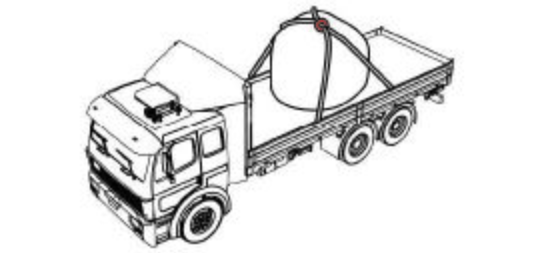
Secure each boulder individually with at least two chain tie-downs forming an "X” pattern over the boulder.
Pass the tie-downs over the center of the boulder and attach them to each other at the intersection by a shackle or other connecting device.
Note: The aggregate WLL of the tie-downs must be at least 50% the weight of the boulder.
Special Circumstances: Securing a Non-Cubic Shaped Boulder with an Unstable Base
The securement of a non-cubic shaped boulder with an unstable base must meet these requirements in addition to the other large boulder requirements in Section 13.
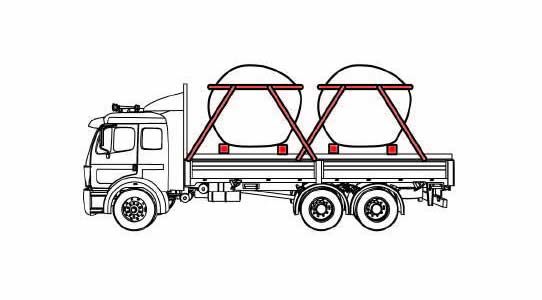
Surround the top of each boulder at a point between 1/2 and 2/3 of its height with one chain.
The WLL of the chain must be at least 50% of the weight of the boulder.
Attach four chains to the surrounding chain and the vehicle to form a blocking mechanism that prevents any horizontal movement.
Each chain must have a WLL of at least 25% the weight of the boulder, and the angle of the chain must be less than 45 degrees from the horizontal.
Multiple-Choice Questions:
Requirements for securing a non-cubic shaped boulder with a stable base include all of the following except:
- Secure each boulder individually with at least two chain tiedowns forming an X pattern over the boulder.
- Wrap chains around the circumference of the boulder.
- Pass the tiedowns over the center of the boulder
- Attach chains together at the intersection

Secure each boulder individually with at least two chain tiedowns forming an X pattern over the boulder.
Pass the tiedowns over the center of the boulder and attach them to each other at the intersection by a shackle or other connecting device.
When using tiedowns to secure boulders, all of the following are requirements except:
- Use only chain to secure large boulders.
- Boulders must be loaded as far back towards the rear as possible.
- Tiedowns should be located in valleys or notches across the top of the boulder.
- Tiedowns must be arranged to prevent sliding across the rock surface.
Requirements

Use only chain to secure large boulders.
Tiedowns in direct contact with the boulder:

Should be located in valleys or notches across the top of the boulder
Must be arranged to prevent sliding across the rock surface.
To secure a cubic-shaped boulder, how many tiedowns are required, at minimum?
- 3
- 2
- 5
- 1
Special Circumstances: Securing a Cubic-Shaped Boulder
The securement of a cubic-shaped boulder must meet these requirements in addition to the other large boulder requirements in Section 13.

Secure each boulder individually with at least two chain tiedowns placed side-to-side across the vehicle.
Place tiedowns as closely as possible to the hardwood blocking used to support the boulder.
When securing a non-cubic boulder with an unstable base, the four surrounding chains must have a WLL of at least:
- 11,000 lbs
- 25% the weight of the boulder
- 50% the weight of the boulder
- 5,000 lbs
Special Circumstances: Securing a Non-Cubic Shaped Boulder with an Unstable Base
The securement of a non-cubic shaped boulder with an unstable base must meet these requirements in addition to the other large boulder requirements in Section 13.

Surround the top of each boulder at a point between 1/2 and 2/3 of its height with one chain.
The WLL of the chain must be at least 50% of the weight of the boulder.
Attach four chains to the surrounding chain and the vehicle to form a blocking mechanism that prevents any horizontal movement.
Each chain must have a WLL of at least 25% the weight of the boulder, and the angle of the chain must be less than 45� from the horizontal.
Complete!
You can Return To The Table Of Contents







 TT On Facebook
TT On Facebook